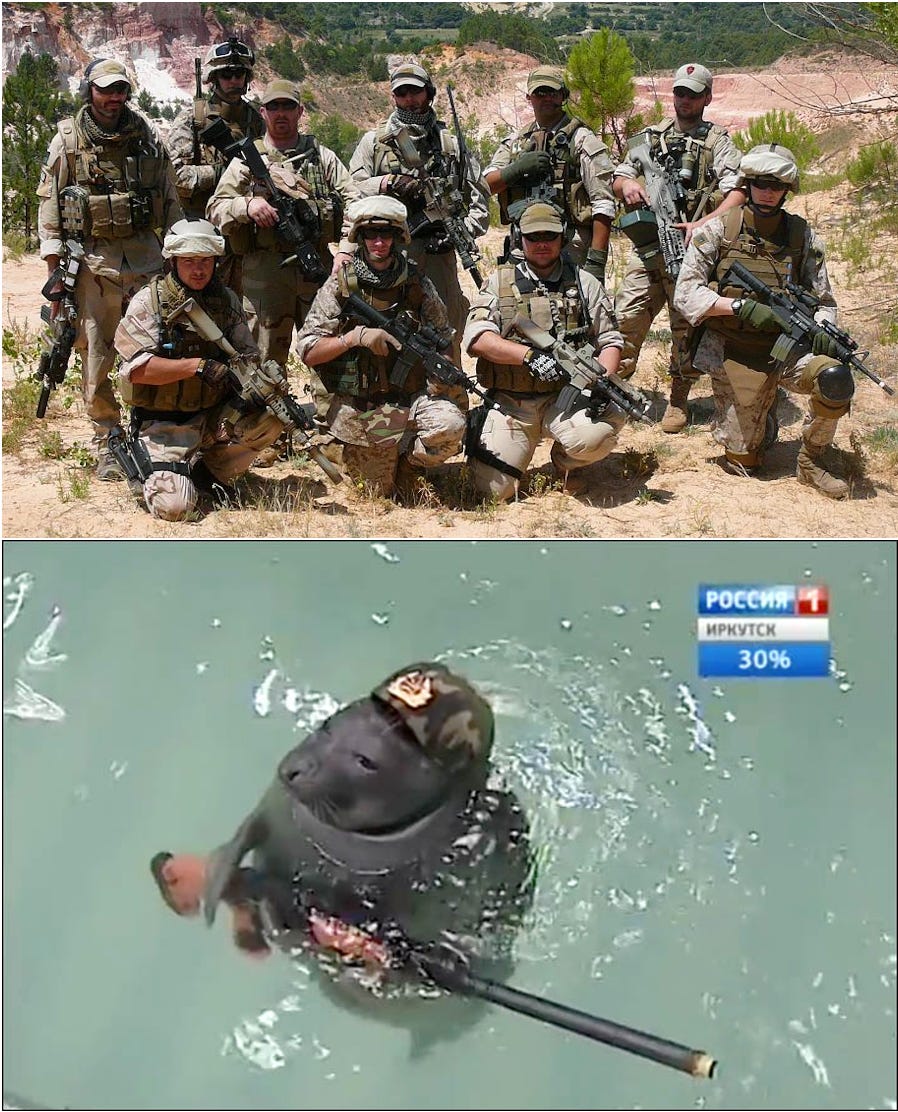Russia's Horny Spy Whale and a Russophobic Shark
Forget the orcas sinking boats in Spain. There's a much bigger battle going on under the sea.
A friendly reminder that Rant! is a reader-supported publication. Please sign up and share! You get a weekly newsletter and paid subscribers get access to my Foreign Influence Operations course and other additional content. I hope you’ll consider subscribing.
ALEX’S WEEKLY RANT
Pods of orcas have been stealing the spotlight recently for attacking a number of boats off the Iberian coast, ramming the vessels and destroying the rudders. Some experts believe the killer whales are passing on knowledge to the next generation about how to rule their watery territory. But these orca gangs are hardly the only maritime killers roaming the depths of the ocean. There’s a much bigger battle being waged under the sea.
Horny Hvaldimir
Recently, fishermen caught sight of what is believed to be a Russian spy whale off the coast of Sweden, and he’s likely horny as fuck. The whale is thought to be 13 or 14 years old and, like most teenagers, his hormones are raging.
The beluga whale was first sighted in April 2019 in Norwegian waters wearing a harness that looked like it could hold a camera or some other device. The harness had the words “Equipment of St. Petersburg” on it. Norwegian marine researchers contacted a number of their Russian counterparts to ask if this was their whale. “Nyet!” came the responses, leaving the Norwegians to conclude the whale is part of a Russian navy program that has given “military-grade training” to whales and dolphins to monitor and protect waters around navy bases. The Norwegians named this particular whale Hvaldimir, a play on the words hval—Norwegian for whale—and Vladimir.

Hvaldimir’s most recent spotting, on Sweden’s southwest coast, indicated he has sped up and is now very far from his natural environment. Researchers believe the poor guy hasn’t seen a single other beluga whale since he first began trawling the Norway coast in 2019. Four years! At this point, I wouldn’t be surprised if he started rubbing up against ship rudders just to feel something.
We don’t know for sure if Hvaldimir has received military-grade training, but after four years without a companion, he’s probably got so much pent up energy, he’ll fight anyone.
Professional Seals
Hvaldimir is hardly the only one of these very special forces. The Soviet Union first began experimenting with water mammals for military use in the 1980s. That program reportedly shut down in the 1990s, but a similar one was revived in 2017. Dolphins and seals were trained to carry tools and detect weapons, like mines and torpedoes. Beluga whales were recruited to help guard entrances to naval bases and assist deepwater divers. It was a real marine recruitment drive.
While most of this activity was focused on the arctic, as Vladimir Putin opened more military bases there to establish Russian dominance over the region, some of these military mammals have been put to work in warmer waters. Satellite photos reveal that Russia has deployed a number of dolphins to the Black Sea to protect its Navy base there.
It’s possible Hvaldimir has gone AWOL. The Murmansk sea biology research institute concluded that beluga whales like Hvaldimir were not really suited for military jobs. The whales, it seemed, lacked the “high professionalism” of the seals.
The Few, The Proud, The Marine Animals
The United States has also experimented with enlisting marine animals. In the 1960s, the CIA developed Project OXYGAS, which looked to use dolphins not only to detect weapons, but also to place explosives on enemy ships, turning these docile creatures into killing machines. The CIA also dreamed of using them to perform underwater reconnaissance to place sonar and other sensors. The Agency was encouraged by the dolphins’ performance, but it unclear how successful this program was or how long it lasted. (It was declassified in 2019.)
More recently, the US military deployed dolphins to Iraq in 2003 to sweep for mines in ports there.

Russophobic Sharks
Earlier this month, a Russian tourist was eaten by a shark at an Egyptian resort. A few days later, an individual using the name Miroslav Latik launched a petition on the city of Kyiv’s website urging the city to build a fountain to honor “the shark-fighter against the Russians, which will have cultural, historical and ideological value for the city and the country.”
The petition is real (it had more than 4000 signatures at the time I wrote this). The Google translation does not say it is a monument to that specific Egyptian shark that ate the poor young man (although the timing is, well, quite a coincidence). In any case, the Russian government has made that connection.
Now, a number of outlets in the Russian and American far-right ecosystem—many of which don’t look legitimate and all of which source the original article back to RT, a Russian state-run propaganda outlet—are crying out, “Russophobia!” and linking the petition to out-of-context quotes about “the West” insisting that killing Russians is the only way to join their club. Of course, official Russian social media accounts are amplifying the narrative.
Miroslav Latik, who suggested this altar to the shark (either the Egyptian one specifically or “the shark” generally as a fighter), has locked his facebook profile, but appears to be a Ukrainian film director. I can only assume he is working on a Ukrainian film version of Jaws.
THE WEEK’S LINKS
A roundup of stories you should be reading
RUSSIA
Russia Sought to Assassinate an Informant in the U.S. (NY Times)
CHINA
EU looks to ban companies from making sensitive tech in China (Politico)
Italy puts the brakes on Pirelli’s Chinese shareholder (Politico)
US AND RUSSIA
John Durham Admits He knows Little About Russia Scandal (New York Magazine)
Alex Finley is a former officer of the CIA’s Directorate of Operations, where she served in West Africa and Europe. She writes and teaches about terrorism, disinformation / covert influence, and oligarch yachts. Her writing has appeared in Slate, Reductress, Funny or Die, POLITICO, The Center for Public Integrity, and other publications. She has spoken to the BBC, MSNBC, CNN, C-SPAN’s Washington Journal, France24, and numerous other media outlets. She was also invited once to speak at Harvard, which she now tells everyone within the first ten seconds of meeting them. She is the author of the Victor Caro series, satirical novels about the CIA. Before joining the CIA, Alex was a journalist, covering Capitol Hill, the Pentagon, and the Department of Energy. She reported on issues related to national security, intelligence, and homeland security. Did she mention she was invited to speak at Harvard?







